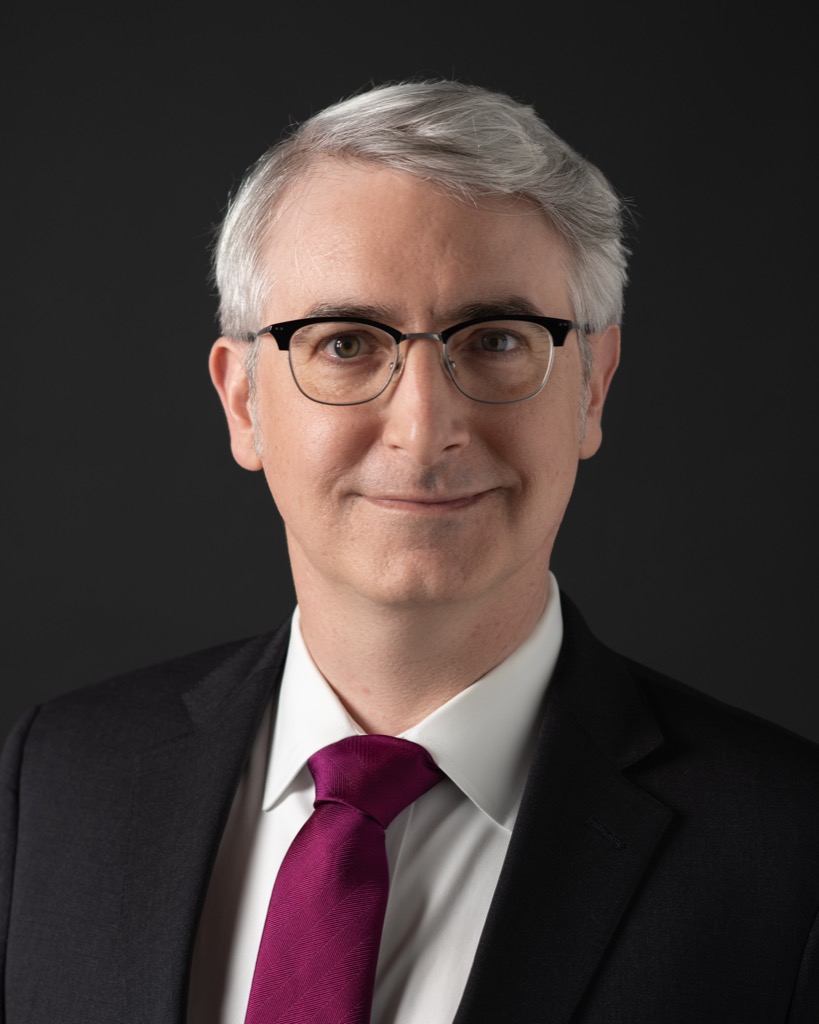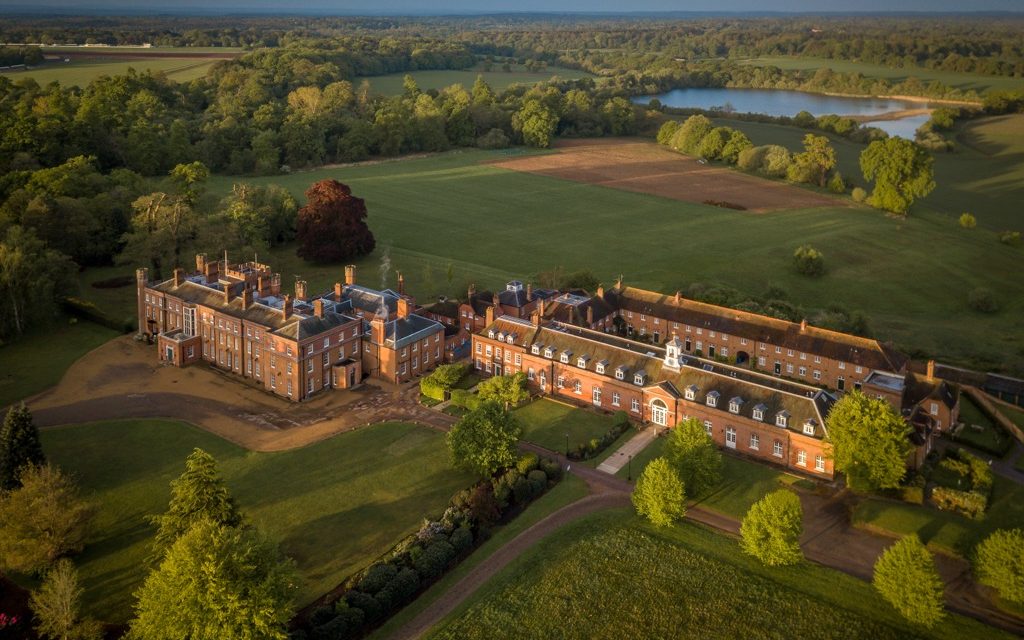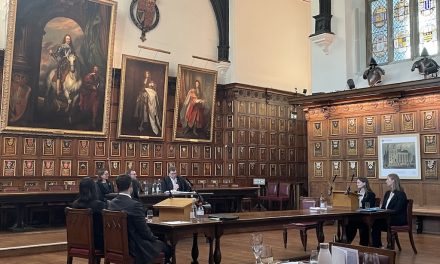On a rainy Friday morning, jet lagged and confused, I hopped into a black cab with instructions to go directly from Heathrow to Windsor. Those were all the details I could remember from my call with Christa Richmond. I crossed my fingers that my cab driver, Ian, knew what to do as I cursed my American mobile that refused to show any bars. I should have stopped at the sim card kiosk on my way out of the airport. Thankfully, Ian was cheerful and knew right where to go.
In retrospect, had I any mobile reception with my nose buried in the screen, I might have missed the scenic drive into Windsor Great Park. The landscape slowly changed from a busy highway to grand country estates in just a 30 minute ride. With the lush green fields and ancient oak trees, I felt more like I was stepping into Tolkien’s Middle Earth than attending a trial advocacy conference.
Then we came to Cumberland Lodge itself: modestly palatial. I stood and marveled a few moments at the distinctive red brick, three story baroque main building. I was dumbfounded at the privilege to spend three days here. This was not going to be like my county attorney conference at the Hilton in Cedar Rapids, Iowa.
I was the first attendee to arrive. The friendly staff were alerted to my early check-in. They escorted me to my room, past museum-like paintings depicting various historical figures and events. After a brief, necessary nap, and a side trip to Windsor town, I settled into the tapestry room next to a warm fire and a coffee. The jet lag was wearing off.
Several of Benchers and members sporadically arrived and joined me by the fire. Alan Robertshaw, Master Stephen Lloyd, and William Hawkes-Reynolds were all welcoming and prepared me for what was to come. The students then arrived by coach and the tapestry room became a bustling hub. My new companions escorted me to the main hall to begin the weekend.
The lecture portions of the weekend were in an adjacent two-story building which I learned was a converted horse stable (the horses had it good). After sizing up the main room I decided the far back corner was where I would be less likely called upon. I discovered it was also where the miscreant Benchers and latecomers congregated (I’ll refrain from sullying their esteemed reputations here). They, like me, hoped to avoid notice by the lecturer. Despite their attempts to be inconspicuous by slinking in their chairs, they were more often named with direct inquiries from the stage. This demonstrated to me the English way to answer by standing when called and projecting your voice.
The tone of the weekend was set; this was a place to experience the fundamentals of trial advocacy from professional practitioners. The students were invited to try, fail, listen to criticism, adjust, and try again. Most of all, they were encouraged to overcome fear.
The next morning, six students and I filed into the Lodge’s library with Master Bernard Richmond for a break-out session. It did not take long to realise I was more Master Richmond’s student than a fellow teacher. I watched in awe as Master Richmond gave instruction, listened intently to every word the student said, and then recited it back verbatim. Master Richmond was careful to provide constructive advice on phrasing, inflection, and content. I cannot compare this method to anything stateside. In the last session on Saturday, Master Richmond demonstrated an absolute masterclass in cross examination. I was enthralled. It was as if I were sitting in the National League scrimmaging with a Premier League team.
Somehow, that afternoon, I was coaxed into giving a talk on American closing arguments with Master Louise McCullough. In reality, my advice was the wrong practice for a closing speech, ‘what do you mean you cannot point at the opposing party? Don’t you want to win?’ Thankfully, the discussion was saved by Master McCullough, who correctly advised that the best way to learn American trial advocacy was to watch the comedy classic My Cousin Vinny. And she was spot on.
But it was the unscheduled and impromptu call-up session on Saturday evening which was the most memorable. The Bencher and I were each asked to stand and give practical advice to the students. I was moved by the sometimes funny but always inciteful wisdom. I found Master Simon Myerson’s advice very thoughtful: always speak well of fellow barristers. Young lawyers need to hear that from practicing lawyers so that we always aspire to maintain our professional collegiality. Experienced lawyers often need that reminding too. This advice session really should become a Cumberland Lodge tradition.
On Sunday I was fortunately paired with Master Teresa Hay. After our mitigation in punishment session, we had a delightful conversation about a programme for ‘vulnerable witnesses.’ I was interested with her description of the practice and the evidence-based way English lawyers learn to deal with witnesses who have particular needs.
Also on Sunday morning, Christa Richmond gave a tour of the park to a privileged few of us as we walked to All Saints Chapel for services. It was a perfectly beautiful morning stroll and Christa told us stories from her time working in the park. I found the chapel quaint and not at all what I expected to be a favourite church venue for the late monarch. It was also the only time I have seen a church service begin with ‘God Save the King.’
When the weekend concluded, I hitched a ride back to London on the coach. I revealed myself to be a tourist while snapping pictures of Parliament and the London Eye. Still with no mobile reception, I asked for some help to find my lodging. Master Steven Powles was kind enough to accommodate me. As we rolled our suitcases along the Strand, Master Powles talked about his upcoming trip to Iraq, where he was going to train lawyers and judges. I could not hide my surprise that his career took him on such amazing adventures.
I have now had a few weeks to reflect on this experience at Cumberland Lodge. While the Masters ran the show all weekend, the students were the stars. I was so extremely impressed with the bravery of aspiring lawyers to stand in front of their peers and volunteer to be scrutinised by professional lawyers. The sessions were just exercises with no real consequence, but the pressure for them was still tangible. Some students were naturally good at presenting, others were humbly exceptional and doubted their own talent. We reminded them that they have what it takes to be great advocates. Looking back when I was a student, I know I would have been paralysed by fear of having to perform like them. It was inspiring to see these students overcome their own inhibitions and ease into confidence.
Having spent the weekend happily immersed in the legal culture of Middle Temple, I could now say I was no longer a stranger in the UK. The Honourable Society of the Middle Temple has my sincere gratitude.
But next time, I will buy that temporary sim card.
Thank you to Christa Richmond for being a great host, and Master Bernard Richmond for taking me to The Old Bailey for his trial. A big thank you as well to my US mentor Master Nick Critelli for introducing me to Middle Temple and inspiring me to become an English solicitor. I would have loved to join the Bar, but could not take the time off judicial duties for pupillage.

Brendan Greiner is a district associate judge for Iowa, United States. He presides over criminal court, jury trials, and magistrate appeals. Before taking the bench in 2018 he was a career prosecutor who specialised in financial crime and vehicular homicide. He also recently became a solicitor for England and Wales. He would have loved to join the Bar but could not take the year off from his judicial duties for pupillage. Prior to 2023 Judge Greiner’s only connection to the United Kingdom was that he comes from the same hometown in Iowa as Bill Bryson.





